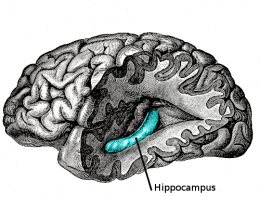November 18, 2010 report
Study suggests reliance on GPS may reduce hippocampus function as we age

(PhysOrg.com) -- McGill University researchers have presented three studies suggesting depending on GPS to navigate may have a negative effect on brain function, especially on the hippocampus, which is involved in memory and navigation processes.
There are two major ways of navigating: by spatial navigation or by stimulus-response methods. The spatial method uses landmarks and visual cues to develop cognitive maps that enable us to know where we are and how to get where we want to go. The second method relies on repeatedly traveling by the most efficient route, as though on auto-pilot. The second method will be familiar to those using GPS.
Functional magnetic resonance imaging (fMRI) scans were taken of older adults who were GPS and non-GPS users. The subjects accustomed to navigating by spatial means were found to have higher activity and a greater volume of grey matter in the hippocampus than those used to relying on GPS. These adults also did better on a standardized test used in the diagnosis of mild cognitive impairment, which often precedes the onset of Alzheimer’s disease.
The hippocampus is believed to be involved in memory and in navigation processes such as the ability to find new routes and identify short cuts. It is one of the first areas of the brain to be affected by Alzheimer’s disease, which results in memory loss and difficulties in spatial orientation.
An earlier study by University of London researchers showed that in London taxi drivers, who spend three years learning their way around London by spatial methods rather than GPS), part of their hippocampus is larger than in a control group of non-taxi drivers. See the PhysOrg article: http://www.physorg.com/news140336390.html, for example. As in the current research, the presence of a link does not necessarily show causality, and in the London cabbies, the sheer volume of knowledge they must gather may also be involved.
Neuroscientist Veronique Bohbot of McGill University in Montreal, Canada, said the results of the studies suggest using spatial memory regularly may improve the function of the hippocampus and could help ward off cognitive impairment as we age.
Bohbot suggested it may be wise to restrict GPS use to an aid in finding the way to a new destination, but to turn it off on the way back or when going somewhere that is not new. Building cognitive maps takes time and effort, but with the hippocampus, it may be a case of “use it or lose it,” and Bohbot said she does have fears that reducing the use of spatial navigation strategies may lead to earlier onset of Alzheimer’s or dementia.
The McGill University studies were presented at the Society for Neuroscience's annual meeting last weekend.
More information: Neuroscience's annual meeting: www.sfn.org/am2010/
© 2010 PhysOrg.com















